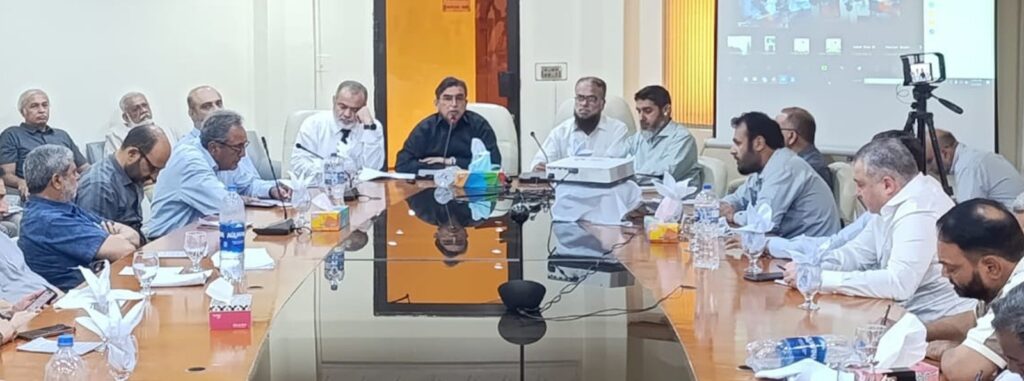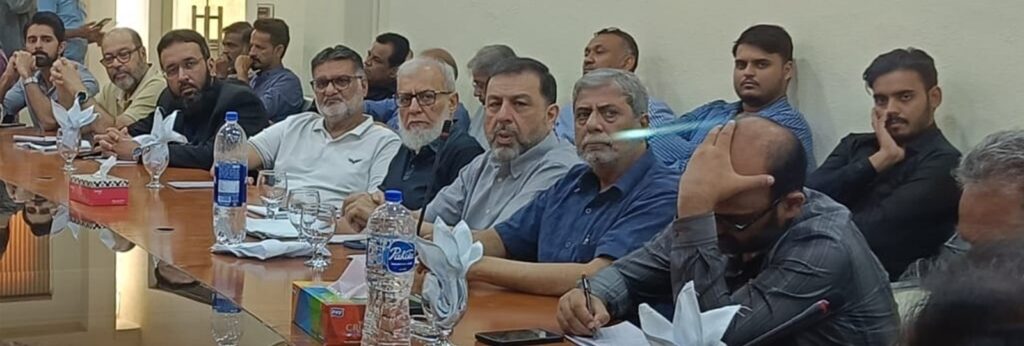EFS was developed to simplify export procedures
and enhance Pakistan’s export. Imposing sales
tax at the import stage defeats its purpose
Business Reporter

Karachi: The Pakistan Hosiery Manufacturers & Exporters Association (PHMA) Chairman Muhammad Babar Khan has strongly opposed the All Pakistan Textile Mills Association’s (APTMA) recent call to impose sales tax at the import stage under the Export Facilitation Scheme (EFS) 2021. He warned that such a move would sabotage exports, worsen the liquidity crisis, and harm the textile industry.
Babar Khan described APTMA’s stance as irrational and misleading, questioning why the association—after supporting the EFS since its inception in 2021—has now changed its position. He urged APTMA to support PHMA’s demand to retain the original structure of EFS prior to the Federal Budget 2024-25.
“EFS was developed with broad stakeholder consultation to simplify export procedures and enhance Pakistan’s export potential. Imposing sales tax at the import stage defeats its purpose,” Khan stated.
PHMA Demands Restoration of Local Procurement Under EFS
PHMA has demanded that the government reinstate local procurement privileges under Section 880(1)(b) of SRO 957(I)/2021, which allowed local purchases of input goods against zero-rated invoices. This measure ensures a level playing field for the entire textile value chain.
Babar Khan warned that imposing sales tax on imports under EFS would be another “fatal blow” to liquidity-starved apparel and textile exporters, many of whom already face delays in sales tax refunds. He noted that the collection of sales tax from exporters—only to later refund it—is a futile exercise, adding no value to revenue collection and increasing the risk of tax fraud.

EFS is Key to Enhancing Export Competitiveness
Babar Khan emphasized that EFS has proven to be a crucial tool for exporters. The scheme consolidated previous facilitation programs, reduced documentation, and enabled access through a fully automated digital platform via WeBOC and Pakistan Single Window (PSW). Real-time audits and end-to-end traceability have helped regulate compliance costs and ease liquidity pressure for exporters.
He pointed out that successful export-driven economies like Bangladesh and Vietnam also operate schemes similar to EFS, supporting their import-dependent textile sectors.
Industry Urges Government to Avoid Imprudent Decisions
Khan cautioned the government against taking “unwise and imprudent actions” that could reverse the efforts of the export industry. He highlighted the already sky-high costs of manufacturing, record energy tariffs, and expensive inputs, which have rendered several industry segments unviable.
“Imposing sales tax in EFS will not increase tax revenue but will worsen the trade deficit and slash export earnings,” he warned.
Instead of burdening compliant exporters, PHMA called on the government to target non-taxpayers who are not contributing to the national exchequer and continue to evade taxes.






















